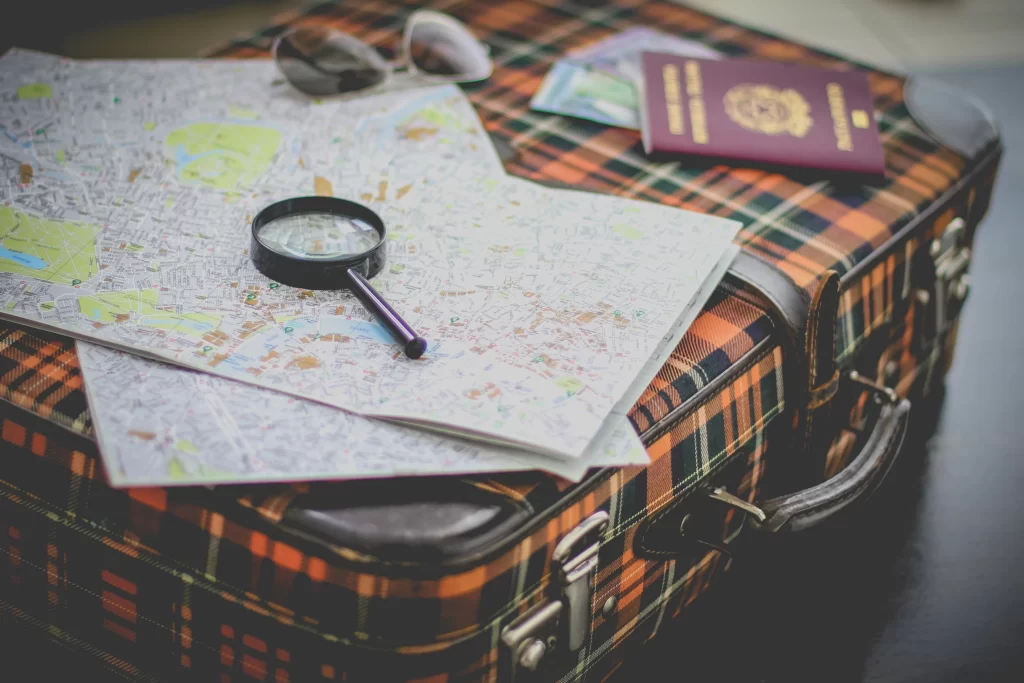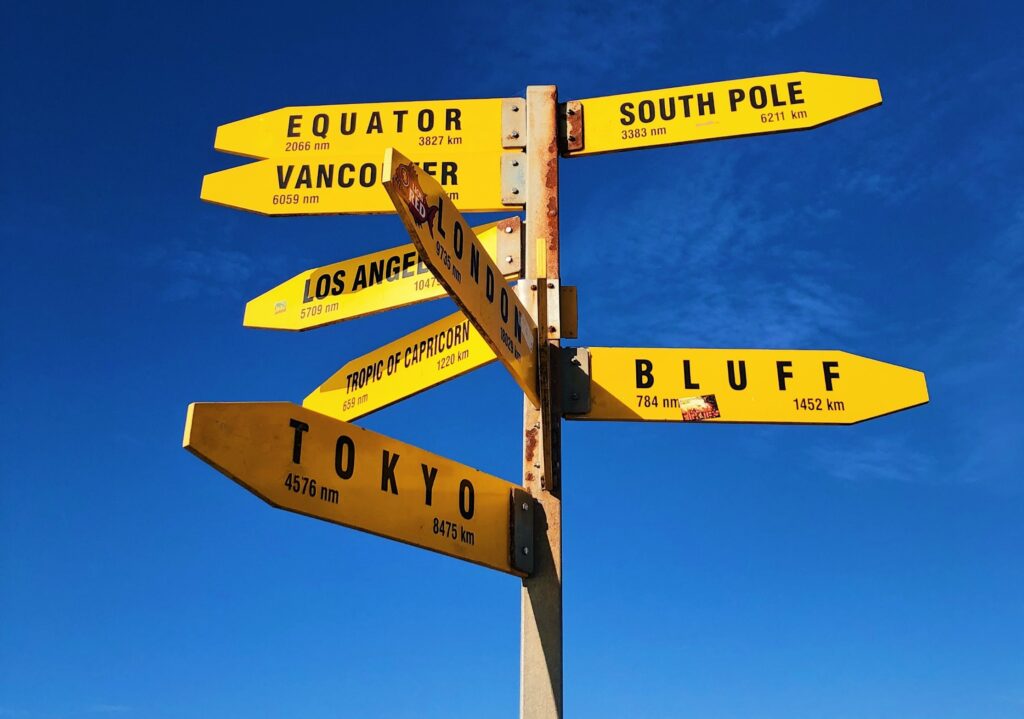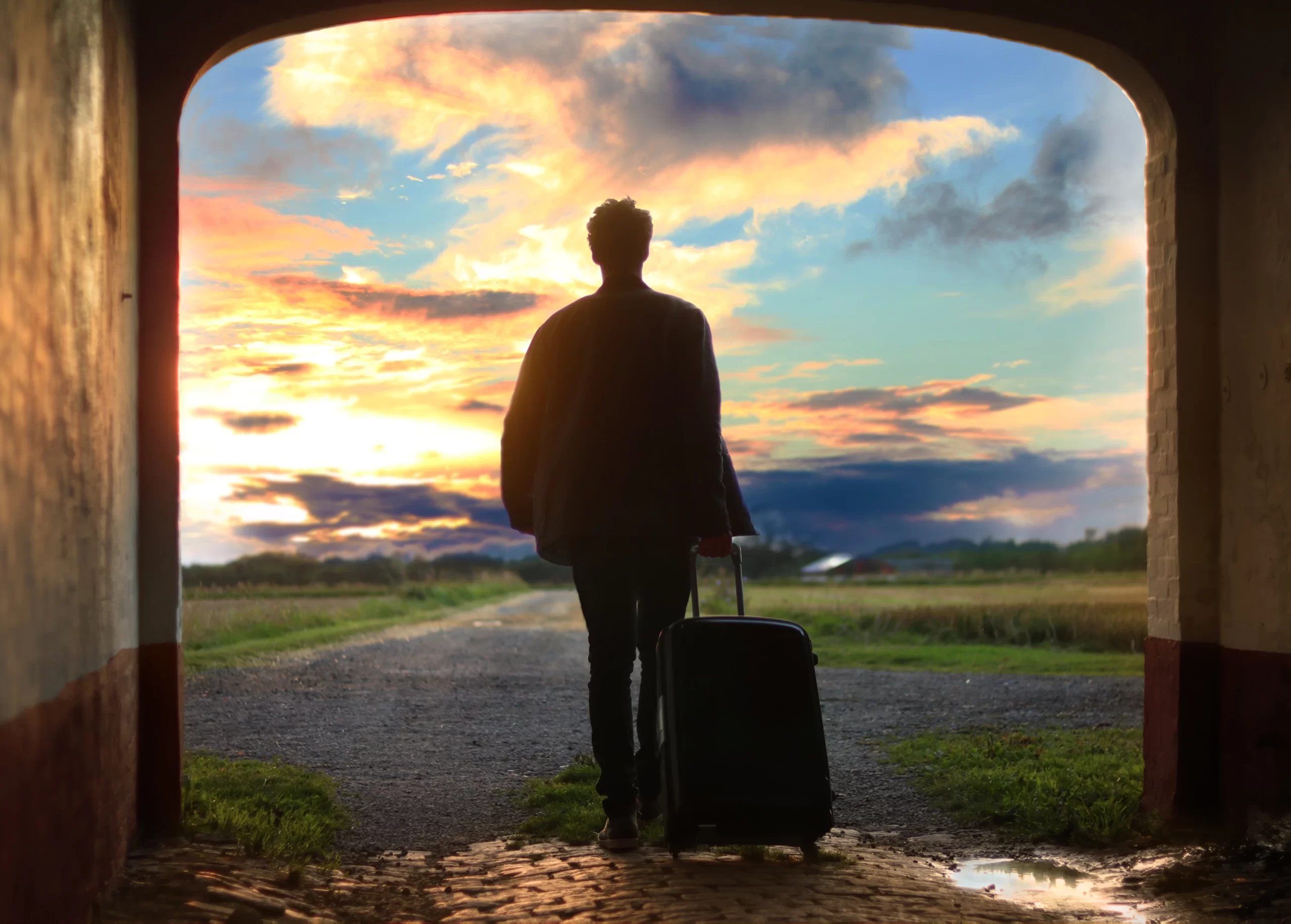Note: This post was originally published on Mike’s Travel Blog on June 16, 2023.
Hi everyone! I wrote most of this blog post a month ago and never posted it because I wasn’t sure if it was too convoluted. But I never got around to changing it and I’m leaving for Switzerland tomorrow, so I’m going to share this as is and hope for the best.
Please note that I do not receive any compensation or kickbacks from any companies, websites, or individuals. So any website or product recommendations here are entirely my own.
And now, without further ado, here are my top 5 tips for independent travel:
1. DO YOUR RESEARCH

Some people like to go into a trip blindly with as little knowledge about their destination as possible because they enjoy the surprises. They may have a point, but in my experience, a little research goes a long way towards making a journey more enjoyable, especially if it’s to a place you might only visit once in your lifetime. During my first international adventure in 2006, I remember hauling around a dogeared copy of the Let’s Go Guide to Central America. Technology has come a long way since then, and there is now a plethora of free resources online to help you plan the perfect trip. Here are a few examples:
- Travel blogs: What a coincidence—you’re reading one right now! Travel blogs can be a great starting point to get you started thinking about where and when to go, what to include on your itinerary, and things to be aware of. There are specialized blogs for every location, lifestyle, and mode of travel. Often they include links to other great resources as well. One blog I recommend for any trip that involves travel by train is The Man in Seat 61. It was a great resource when I was planning to take the Trans-Siberian/Trans-Mongolian Railroad and I’ve found it useful for subsequent trips as well.
- Travel forums: These can be hit or miss. Not everyone who posts on a forum like TripAdvisor or Frommer’s knows what they’re talking about and everyone’s experience is different. That being said, it can be very useful to post a question in an online travel forum and get feedback from people who’ve been where you’re going or are actually from there. Usually if someone responds with bad information, other users will correct them.
- Social media: I deactivated my Facebook account for personal reasons but one thing I miss about it is the travel groups. If you search for the term “Travel tips” and the name of the place you’re planning to visit, you can often find some really amazing and supportive groups. I found this immensely helpful when planning my trip to Iceland last year, and it helped again when planning my most recent trip to Europe. One great thing about these groups is that people post amazing pictures of their trips which can be a wonderful inspiration to add somewhere new to your itinerary.
- Official government websites: By this I mostly mean visitor-oriented websites from the government of the country, state/province, or city you’re going to, but also visit your own government’s websites for information about passport and visa requirements, travel advisories, health and safety, etc. I would also definitely check the World Health Organization’s website before any international travel.
- Audio-visual sources: There are tons of informative and exciting travel videos on YouTube and other video platforms (not to mention actual TV documentaries). Another source of information that I have really enjoyed has been travel podcasts. I recommend the Zero to Travel Podcast for general inspiration. Currently, I’m also getting a lot of great tips from the Holidays to Switzerland Travel Podcast, which also has a Facebook group. The great thing about podcasts is that you can listen to them while doing other things, so it doesn’t necessarily have to take time out of your busy schedule.
- Guidebooks: Travel guidebooks may be somewhat old school, but they are still a great source of information. You can usually borrow them for free at the library (although they may be a year or two out of date). Nowadays, almost all guidebooks are also available in digital format, so they no longer have to take up space in your luggage.
- Language and culture resources: When visiting another country, you should always try to learn a little bit of the local language(s) and customs, even if English is widely spoken as a second language. For one thing, it’s a sign of respect, and even saying a few words like “Hello” and “Thank you” in the local language will go a long way towards showing people that you genuinely want to connect with them and their culture. Learning some of the language and customs can also be a lifesaver (sometimes literally) and will make life much easier and less stressful for you. In addition to phrasebooks and dictionaries (which you can borrow from the library or download digitally for a reasonable price) there are many free language resources out there, including videos, podcasts, PDF cheat sheets, interactive mobile apps, and more. To prepare for my trip to Switzerland, I’ve been learning some basic German using Germanpod, Duolingo, and several other sources. I also made sure to download offline versions of Google Translate and installed the German and French language packs on my phone. If you’re going to be visiting somewhere for an extended period of time, or you’re going somewhere where English speakers are hard to find, you might want to invest some time and money into private lessons or even arrange for an immersive language-learning program in the country you’re visiting. It’s also important to research the customs of the place you’re visiting. In some cultures it’s rude to look someone in the eyes—in others, it’s rude not too! Wearing certain types of clothes can get you into trouble in some places while not wearing them can get you in even bigger trouble in other places. In some places, small talking strangers and making physical contact is expected, while in other places it’s discouraged or even offensive. No-one expects you to be an expert in the culture of a place you’re visiting for the first time, but it behooves you to do at least a little bit of research.
- Personal contacts: I have been helped out tremendously by seeking advice from friends, family members, and coworkers who have been to places I want to go. What’s great about talking to personal contacts is that you can have more in-depth conversations with them or ask them for details that a stranger on the internet might not feel comfortable sharing. And presumably, you can trust them a lot more than a stranger too! If you think you don’t know anyone who has been to where you’re headed, there’s a fair chance you’re wrong about that. Ask around, you might be surprised what you don’t know about the people in your life. And if they haven’t been there themselves, maybe they know someone who has.
2. TIME YOUR TRIP RIGHT

Often we don’t have much control over when we can go on vacation. But you should still put some thought into whether or not it’s a good idea to visit a particular destination. What is the weather like at different times of year? Will it be suitable for the activities you want to do? Will the country be shut down for a week of national or religious holidays? Does everyone and their mother leave for the beach during the entire month of August? (If your destination is in southern Europe, the answer is probably yes.) Will you be visiting a Muslim country during Ramadan when everyone is fasting until sundown and meal options may be very limited? Will you be arriving during peak tourist season when everywhere will be at its most crowded and expensive? On the flip side, are you arriving during a time where there is such a low level of tourist activity that the places you want to go to are closed and the activities you want to do are not available? If it turns out that this is indeed a bad time to visit your intended destination but it’s the only time you’re free to travel, you may want to consider going somewhere else and saving that trip for another year. Or if you are still committed to going, at least you’ll be prepared and not be disappointed when you arrive.
3. PACK THOUGHTFULLY

Make sure to put a lot of thought into what you pack, starting with what type of luggage you take. If you’re able to pack light, that’s usually preferable for many reasons, although you do want to be sure not to leave behind anything essential. If you need something larger than a carry-on, try to pick something that will be easy to carry. If you plan to walk a lot with your luggage, I recommend a large backpack that you can buy at an outdoor recreation store like REI. The Kelty backpack I took to Central America survived everything from being thrown onto the unsecured roof of a “chicken bus” to hiking up an active volcano. I crossed 5 land borders wearing that thing. If you don’t need to be extra mobile with your luggage, a soft suitcase or duffel bag with a good set of wheels will do fine. I use the North Face Rolling Thunder duffel bag as my go-to. It’s about as big as you can get without paying an oversized bag fee at the airport but it’s completely collapsible except for one side, so it only needs to be as thick as what you put in it. Its wheels are solid. I have carted that thing for miles at a time in cities from Reykjavik to Beijing, and they still haven’t worn out. For my carry-on, I have a small hiking daypack with a waterproof shell that can be rolled up and stored in a pouch until it’s needed.
Even more important than what kind of luggage your bring is what you put in it. While it’s crucial not to waste space with unnecessary items, it’s just as essential to pack the things you’re going to need. Here are some examples of items that I usually pack when going on an international trip (although I don’t always take ALL of these items—it depends on the trip):
- Clothes that can be layered to adjust for changing weather. This includes a thin rain jacket/windbreaker, moisture wicking short-sleeve T-shirts (Dickies makes a very affordable model that comes in a variety of colors), travel pants (UB Tech makes some great and affordable ones you can order online), a zip-up hoodie or fleece, a polyester long-sleeve T-shirt, moisture-wicking socks (Smartwool is good but pricy; for something a little cheaper try Danish Endurance), temperature-control underwear, and a lightweight and durable hat that won’t get ruined by a little sweat. If you’re going somewhere that might get cold at times, pack some polyester long thermal underwear, a warm jacket, and a buff. If you’re going to the desert, a desert scarf is also highly recommended.
- Comfortable walking shoes (and good hiking boots if I plan to do any hiking)
- Shower flipflops
- A small first aid kit
- A water bottle (I use a recycled metal Kleen Kanteen bottle that keeps the contents cold for hours)
- Nutritious snacks that won’t go bad or make a mess (I usually pack travel-size bags of nuts or trail mix)
- Any necessary medications
- A toiletries/personal care bag (I try to pack travel-sized toiletries that will take up less space. I have a really great fold-up travel case to store them in. I’ve used it for almost 20 years and it’s still in good shape. It has several different types of pouches appropriate for different types of items, a built-in mirror, and an adjustable strap to hang on any kind of hook or knob.)
- A portable battery charger/power bank for my phone
- Electrical outlet adapters and/or converters for the country I’m visiting
- Wireless headphones
- A good book that’s not too big or heavy (I like to read something that was written in or about the place I’m visiting)
If I plan to go hiking, camping, or drive anywhere I could get lost or stranded, I also bring a Life Straw (which makes almost any water safe to drink), a head-lantern or mini-flashlight, sunglasses, a compass, adjustable trekking poles, a sweat-resistant handkerchief or bandana, sunscreen, bug spray, etc. If I’m going somewhere where malaria or other mosquito-borne diseases are a risk, I also bring a mosquito net. For road trips I make sure to pack a cooler full of water, a large Stanley thermos that keeps its contents cool for days on end, a car AC adapter, nonperishable food that requires minimal preparation, etc.
If you’re travelling by plane and you’re going on a long trip or the kind of trip that requires lots of gear, you may find that your luggage exceeds your airline’s weight limit for checked luggage and you will be charged an overweight baggage fee. Whenever I have been told that, I have always been able to get back under the weight limit by carrying/wearing my heaviest items onto the plane. I put my hiking boots on, along with several layers of my heaviest clothes/outerwear. I stuff the heaviest items in my carry-on backpack and my jacket pockets. On every international flight, you’re allowed to take one duty-free bag on board in addition to your carry-on luggage and/or personal item. So when I really need to make my checked bags lighter, I buy a postcard or a magnet or a bag of chips from an airport store and ask them for the largest bag they have. Then I stuff it to the brim with my heavier items. Now, to be fair, the only time this was really necessary for me was on a three-week trip to Russia, Mongolia and China via several other countries that involved flying on some of the most extreme budget airlines on the planet. Most airlines have a somewhat more generous weight limit.
4. STRETCH YOUR BUDGET

Everyone has a different budget, but whatever yours is, you can take steps to make sure it will go as far as possible. The first step is to set a budget in the first place. How much money can you afford to spend on this trip? Make sure to leave ample wiggle room for unexpected expenses.
Your single biggest expense is likely to be your plane flight. There are a lot of ways to reduce that expense considerably. If you are lucky enough to have the flexibility to choose when to take vacation time, I highly recommend travelling during the off-season. January-March and September-November are often great times to save money on airfare and hotels and also avoid the crowds. Of course, it depends on where you’re going, and you also want to make sure that you will be there at a time where you will be able to enjoy the kinds of activities you have planned. You should also start tracking airfare prices as early as possible, ideally a year in advance. That doesn’t mean you should buy your tickets that early (although for many destinations in Asia, Africa, and remote regions like the Arctic, you likely should), but you can see when prices go up and down and choose the most opportune time to lock in your deal. This doesn’t need to be as much work as it might sound. Google Flights allows you to track flights on an ongoing basis and gives you a wide range of options for what criteria to include. You will receive an email whenever prices change. There are also a number of websites that will share the best flight deals when they come up. To get full access to these features you may need to pay a small annual fee, but if you purchase even one flight per year that you found on the site, you will save more money than you spend. I signed up for a service called Going (formerly Scott’s Cheap Flights) for a special sale price of $25 per year. Because of a deal I found there, I will be spending my birthday in Portugal this year for about $400 roundtrip for a direct nonstop flight with a flexible cancellation policy. I could have gotten an even cheaper flight if I opted for nonrefundable tickets. Sometimes they will even find you mistake fares which typically only stick around for a few hours before the airline corrects it. You can potentially save thousands of dollars that way because you got a notification, whereas your chances of finding that kind of deal on time by yourself are extremely low.
Another way to save money is on accommodations. Once again, searching early is key. You can also save a ton by staying in a hostel, and many of them are a lot nicer than you might expect. If your budget is so tight that even a hostel seems out of reach, consider couch surfing. There is an international couch surfing network that lets you link up with someone at your destination that has a couch for you to crash on. Sometimes it’s free and sometimes they might ask you to pitch in a few bucks or help out with chores a little. I will admit, when I first heard about this service, I thought it sounded pretty sketchy, but I know people who have done it and they always had great experiences. Hosts are vetted and guests leave reviews, so if anyone is problematic, they will likely be flagged. As an introvert, the idea of couch surfing doesn’t especially appeal to me, but it’s a great way to meet locals in a different country and experience a destination in a more authentic way.
Depending on the season, you might also consider camping—either in a tent or renting a small campervan that can serve as both transportation and lodging. I rented a very nice campervan in Iceland and while it wasn’t cheap, it was still less expensive than renting both a car and hotel rooms. And it gave me the freedom to go anywhere I wanted and change my plans on a whim. Often you can also save a bundle by staying a hotel that’s just a little further away from the center of town of the popular tourist destination you’re visiting. I’ll confess, I tend to be willing to pay a little more for the convenience of being close to everything, but if your schedule is flexible, it can be a great idea to look a little further afield for accommodations.
Another option—especially if you’re going to be in the same city for more than a few days–is to stay in an apartment. However, I would caution against using companies like AirB&B in places where overtourism is a problem. They often contribute to housing shortages for the local population and drive up the price of housing for residents. It can also change the character of formerly quiet neighborhoods for the worse. Some countries have even outlawed AirB&B or put major restrictions on them, but illegal AirB&B listings continue to be rampant and most local governments don’t have the resources to enforce their restrictions. An ethical alternative is FairB&B. Properties listed on their website have to meet several criteria to ensure that they will not negatively impact their local communities. In fact, a portion of the money you spend will go towards a local community project. FairB&B listings are of course much less numerous than AirB&B, but it’s worth checking them out to see if they have something available where you’re planning to go.
Yet another way to save money is to take advantage of special deals and free activities. You’d be amazed at the things you can see and do for free in incredible destinations. There are even free guided walking tours in a lot of cities. Museums that normally charge money often have certain days or hours that they’re open for free. There are also a lot of passes you can obtain, sometimes for free from your hotel. It never hurts to ask. If you plan to travel by public transportation a lot, definitely look into a travel pass. For my upcoming trip to Switzerland, I will be using a 15 day Swiss Travel Flex Pass and a 3 day Jungfrau regional pass. It’s still not cheap, but it would cost much more money to do what I’m planning to do without a pass.
Another thing: Don’t underestimate how much you can save by buying your food at the grocery store instead of going to restaurants for every meal. This was especially true in Iceland! I was able to eat delicious skyr and vegetarian sandwiches, cheese, and pastries for a tiny fraction of what I would have spent in restaurants. In some places, street vendors are also a good option. Learn where the locals buy their food. In Iceland, gas stations are good places to find cheap (and surprisingly decent) food. In parts of Italy, you can easily spend a fortune for a mediocre meal at a restaurant or buy a nice sandwich for very little money at the trattoria across the street.
Last but not least, think about what experiences you care most about on your trip and splurge on those things, while being frugal about things that aren’t as important to you. If you’ve always wanted to eat at a Michelin Star restaurant in Paris, then do it! You can make up the money by staying at a less expensive hotel. If, on the other hand, you want nothing more than to enjoy the luxury of a posh hotel room with your own private balcony, you can do that—just maybe not for your entire trip. Stay at a budget hotel for the first few nights, then live it up for the last 48 hours of your trip. A guest on the Zero to Travel podcast recommended planning out three options for every destination you’re going to: a budget option, a moderate option, and a luxury option. By arranging and rearranging these options to match your priorities, you can make the most out of your budget.
5. PLAN AHEAD BUT BE FLEXIBLE

When I left on my first international trip, a 2 month journey through 6 countries in Central America, the only things I prebooked were my flight and my first hotel room on an island in Belize. (The middle 10 days of my trip were also pre-arranged, because I was participating in a delegation to monitor the elections in El Salvador.) My trip turned out great but I also had lots of time to kill (I had been working as a substitute teacher and could accept or decline jobs as I pleased) and the countries I was visiting were very inexpensive and fairly off the beaten path, with a few exceptions. I was also young and had no problem doing things like sleeping outside on a cot for $1.00 per night on an island in Lake Managua.
These days, I tend to book my hotels in advance, so I can find the best deals on a high-quality, well-located accommodation that matches my preferences. My go-to app for searching hotels is Booking.com. Not only do they have one of the widest selections worldwide at some of the best prices, but I also really like how much you can customize your searches with a surprising degree of specificity to take a pool of hundreds or thousands of hotels and easily narrow it down to a short list of just the ones that are exactly what you’re looking for. The best thing about it is that most of the hotels on the site allow you pay later and cancel for free, making it risk-free to reserve a room months in advance and then change your plans later. That being said, if you are positive about where you want to stay and you don’t need to keep your options open, it’s often best to book directly with the hotel. You can still use Booking.com or a similar site to find locations but then go to the hotel website to actually make the purchase.
Other things to book ahead of time are long-distance train tickets (unless you are purchasing a pass—and even if you are, you might need to reserve seats for some trains: for example, certain panoramic trains in Switzerland can be booked three months in advance and all the window seats will likely disappear in the first 48 hours of that three-month period), rental of camper vans or specialized cars that might sell out (in many countries that includes all automatic transmission cars), popular tourist attractions like the Vatican Museum or the Louvre, fancy restaurants, and anything that you would be crushed if you didn’t get the chance to do.
On the other hand, you don’t want to overbook and make your itinerary into a long to-do list that has you stressing out about making all your appointments in time. That’s not a fun vacation! Leave time to discover new things. Wander aimlessly through the streets of a medieval city and see where they take you. Check out a quaint village or a mountain hiking trail or a weird little museum that a local or a fellow traveler you crossed paths with just told you about. Take that campervan you rented in an unexpected direction. Often, the most magical and memorable experiences of a trip are the ones you never planned for. There are a lot of things that you don’t need to book in advance. In countries with good public transportation networks, you generally don’t need to book regular commuter inter-city trains within the same country ahead of time. In Brussels, I could decide at any time to hop on a train to any of a dozen cities. Most routes ran every 10 or 20 minutes and the prices never changed, nor did the trains sell out. If you get a regional, national, or international pass like the Swiss Travel Pass or the Eurail Pass, you can wake up each morning in a different city or even a different country and decide where to go next when you get to the train station. Many museums and historic sites also do not require advance tickets. Just check ahead of time so you know which ones do.
Most importantly, be ready for your plans to change. While I definitely do recommend some advance planning, we all know what they say about the best laid plans. When something doesn’t work out as planned, try to see it as an opportunity to do or see something else that you might wind up enjoying even more. There are so many great experiences and hidden gems out there just waiting for you to discover them. Don’t let one mishap ruin your vacation! If you arrive with an open mind and a willingness to be flexible, you’re going to have a lot more fun.
I hope you found some of these travel tips useful. I’m excited to report back from my Switzerland trip in July. Until then, take care and good luck with your own summer adventures!





Excellent article. I think it is especially helpful and informative for international travel.
I’m glad you found it helpful!
CJHeZuty
Hey There. I found your blog using msn. This is an extremely well written article. I’ll be sure to bookmark it and come back to read more of your useful info. Thanks for the post. I will definitely comeback.
There are actually quite a lot of details like that to take into consideration. That is a great level to bring up. I offer the thoughts above as general inspiration but clearly there are questions like the one you deliver up where a very powerful thing shall be working in sincere good faith. I don?t know if greatest practices have emerged round things like that, but I’m sure that your job is clearly identified as a fair game. Each girls and boys feel the influence of only a moment’s pleasure, for the remainder of their lives.